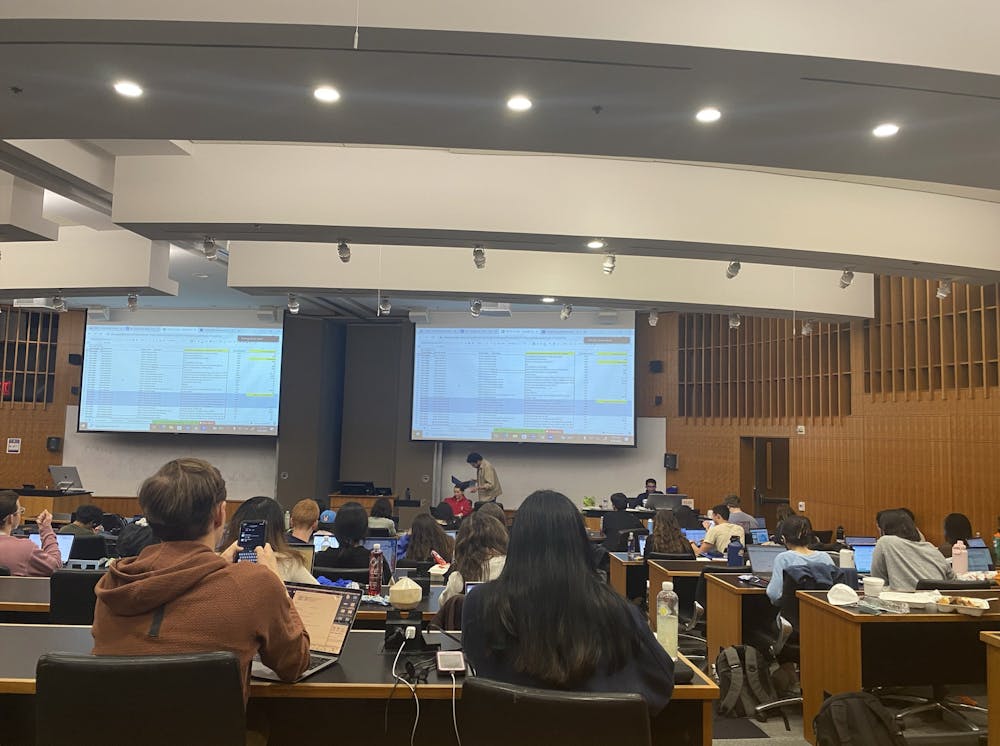Duke Student Government conducted a second reading of the 2022-23 annual budget, cutting nearly $100,000 of funding from its first reading the week before.
The annual budget is allocated once a year for line items that are “essential to a [group’s] presence on campus,” according to SOFC's website. Sophomore Bea De Oliveira, the management and communication vice chair of SOFC, and junior Hadrian Gonzalez Castellanos, the executive vice chair of SOFC, led the annual budget reading.
Before the second reading, the SOFC vice chairs already shaved off funding to $399,767.07—only $232.93 under the budget cap of $400,000. Senators were allowed to contest any funding cuts made before the meeting, but they had to balance the budget while doing so.
Previously, DSG had the option to divert leftover funds to the annual budget, but after the amount spent this year, this was no longer the case.
“In a normal year, we will spend more than $600,000 on programming; this year, for example, we spent almost $800,000 on programming. So, unfortunately, we don’t have leftover funds to divert to [the annual budget],” Gonzalez Castellanos said, noting that this trend could continue for the next few years unless there are big shifts in campus life, such as housing changes or clubs dying down.
One of the items DSG debated was its own funding, specifically from the Judiciary. Upon consideration of the size of the judiciary compared to the legislation, senators reduced the judiciary’s funding by $250 and moved the remaining funds to the legislative discretionary.
Senators also added $120.00 to fund an instrument necessary for Duke Chinese Ensemble.
DSG then covered what funding looked like for competitive groups, particularly for competitions that required qualification rounds to enter.
“We're trying to figure out when we're open to create a fund for competitive groups so that they only apply to the fund when they register and go to conferences,” De Oliveira said. “For now, because we don't have that process in place, it's just kind of in good faith to have [those] competitions happen.”
Gonzalez Castellanos also noted that as of three years ago, SOFC began returning groups’ unused funds back to their initial funds.
After running through 704 requests, the final balanced budget was $399,887.07, which is $112.93 less than the budget cap.
However, some senators remained concerned about the funding available for competitive teams and the determination of which competitions would be considered “essential” for competitive organizations’ existences.
First-year senators Preston Nibley and Viktoria Wulff-Andersen, members of mock trial and model United Nations respectively, echoed worries about funding structures for academic competitions. Nibley pointed to the potential consequences of reduced funding for teams that need to travel across the nation to compete.
“We’ve had several instances in the past two years [when] there have been car accidents because we don’t have the money to buy airplane tickets, so we do 8-hour drives at 3 a.m.,” Nibley said. “There have been teams from other universities–even in the past ten years–where they’ve had students die in car accidents because of a lack of funding.”
Ultimately, SOFC hopes to assuage these remaining concerns by establishing a fund for competitive teams over the summer.
“Next year, when this time does come around, [competitive teams] will have that competition pot, and we can fully fund [them] where [they] need to go to competition,” De Oliveira said.
In other business
Senators allocated $1,800.00 from Duke Sangeet’s Spring Showcase, $2,925.00 for the Muslim Student Association’s Ramadan Iftar April 12 to 14 programming with the Center for Muslim Life and $3,900.00 for its April 18 to 21 programming, $2,645.00 for On Tap’s Spring Showcase, $2,746.00 for Street Medicine’s showcase and $2,100.00 for Defining Dance Movement’s Commercial Dance Workshop. Senators also allocated $3,273.64 from the DSG General Fund for Mi Gente’s Mezcla.
DSG senators approved changing the Native American Student Alliance’s name to the Native American/Indigenous Student Alliance in an organizational step towards inclusivity.
Incoming DSG President Lana Gesinsky, a junior, and incoming DSG Executive Vice President Devan Desai, a junior, presented descriptions for the 2022-23 Cabinet. All positions exempting the co-directors of racial and multicultural diversity and outreach will have a single student director.
Get The Chronicle straight to your inbox
Sign up for our weekly newsletter. Cancel at any time.

Audrey Wang is a Trinity senior and data editor of The Chronicle's 120th volume. She was previously editor-in-chief for Volume 119.

